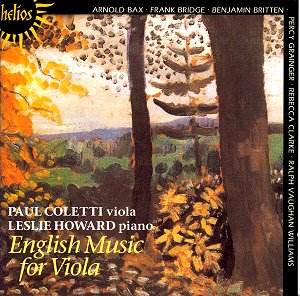I forget which was the disc which first alerted us
to the fact that Rebecca Clarke was a composer to be reckoned with,
but I think it may have been this one. Certainly this big (even if it
lasts a mere 21’ 18" by the clock) and challenging sonata should
leave no one in any doubt. A viola-player herself she knew how to exploit
the particular tone-colours of the instrument, yet the piano part –
a truly equal partner - is no less rewarding, with its range of post-impressionist
timbres. There are more overtly French leanings than we are wont to
hear from the mainstream English composers of the time (maybe a question
of textural luminosity more than anything else), yet the cut of the
themes is definitely English. The hard-hitting scherzo is a very striking
piece, while the outer movements unite surging emotion and gentler poetry
with a firm structural hand. The two shorter pieces are also rewarding
and resourceful.
Another viola player was Frank Bridge – how violists
must regret that he never wrote a sonata to put alongside his magnificent
Cello Sonata (of which
I recently recommended a very fine recording by Oystein Birkeland
on Simax PSC 1160). The two pieces here, which are all he wrote for
his instrument, say a remarkable lot in a short space of time.
It was typical of Vaughan Williams to call a piece
a Romance, and then to write a big-boned, impassioned outpouring – and
then not even bother to publish it! About the Bax Legend I am not so
sure. Coming between the 3rd and 4th Symphonies
I would have expected something more obviously Baxian. It has fine moments
but it also reminds us that Bax, when inspiration was not forthcoming,
tended to go ahead and write anyway. The Grainger Carol arrangement
explores the viola’s lower sonorities remarkably (very remarkably
considering this wasn’t even its original form – like so much Grainger,
numerous versions abound) but the Humlet seemed to me a bit gritty for
what it’s supposed to represent. I’m afraid the 14-year-old Benjamin
Britten’s piece said nothing to me.
Finely committed performances. I did wonder about two-thirds
through if Coletti was not over-using the device of upward portamenti
which, together with a strong and fast vibrato, create a gypsy-style
effect at times. But this is a matter of personal taste and there is
no doubt he’s an excellent player and works well in duo with Howard.
The recording seemed a bit close in the two solo pieces but this is
a marginal quibble and some might prefer it like that.
All in all, the record serves to show that, thanks
to Lionel Tertis’s inspiration, Great Britain probably produced a larger
20th Century viola repertoire than any other country, and
there must be much more to discover. I remember working at a fine sonata
by Thomas Pitfield in my schooldays with a viola-playing friend, for
example, and would rather like to hear it again. And, since another
point of this CD is the rediscovery of a splendid woman-composer, could
I point out that Dorothy Howell might equally repay examination? Don’t
think I have a personal interest, she was no relation of mine; but some
of her shorter piano pieces that I have seen are decidedly impressive.
Christopher Howell

![]() Paul Coletti (viola), Leslie
Howard (pianoforte)
Paul Coletti (viola), Leslie
Howard (pianoforte) ![]() HYPERION HELIOS CDH55085
[66.51] Budget price
HYPERION HELIOS CDH55085
[66.51] Budget price